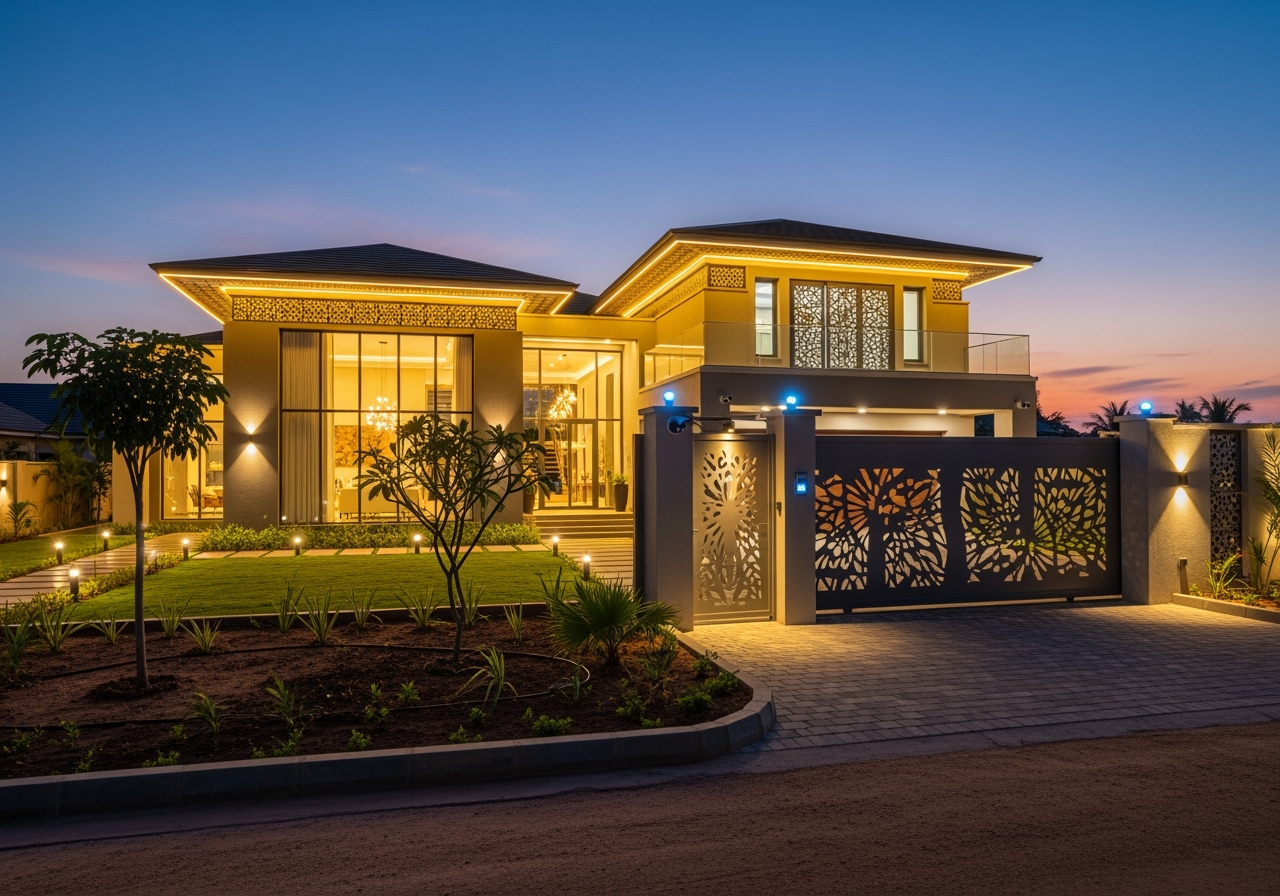As technology continues to shape the way we live and work, our homes are evolving too. Smart home technology, previously regarded as a luxury or a gimmick, is now becoming a practical and necessary component of modern life. Smart homes are transforming the way we think about convenience, security, and energy use.
But what precisely constitutes a smart home? And why is it becoming such a significant topic in Ghanaian real estate, particularly among homeowners, developers, and first-time buyers? In this piece, we’ll break everything down.
What is a Smart Home?
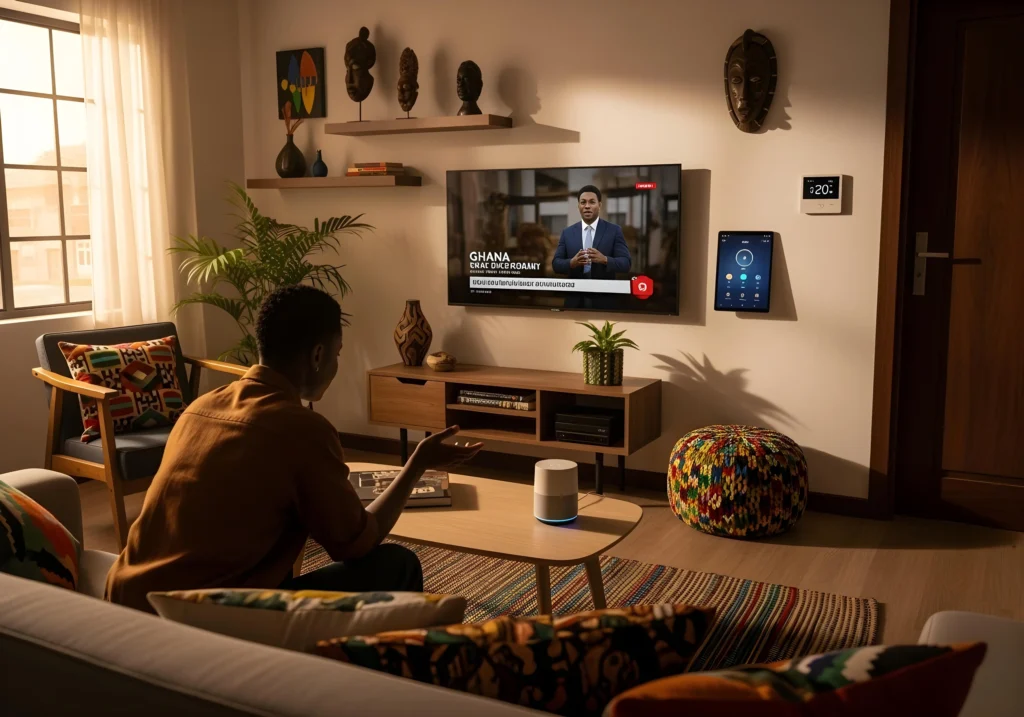
A smart house is a home that is outfitted with technology that allows you to control and automate numerous systems and appliances, generally via a smartphone, tablet, or voice assistant. These systems might include lighting, security cameras, door locks, air conditioning, entertainment systems, kitchen appliances, and even window blinds.
At its core, smart home technology connects various gadgets via a central network or hub, often the internet or a wireless protocol such as Wi-Fi or Bluetooth. Once linked, these devices can “communicate” with one another by responding to orders, schedules, or sensors.
For instance, you could:
- Before retiring to bed, use one voice command to turn out all of your house’s lights.
- Receive a smartphone alert when someone enters your complex or if a door is left open.
- Before you get home, use your phone to adjust the temperature in your room.
- Set your outside lights to switch on automatically at dusk.
- Use voice commands to play music or manage your TV without having to raise a finger.
In Ghana, where energy management, security, and coping with power fluctuations are major problems, a smart house provides practical benefits. Many smart systems provide offline or backup functionality even when the internet is down to ensure that security and control are not jeopardised.
The attraction of smart homes extends beyond their novelty and convenience. It’s in how they make your life safer, more energy-efficient, and sensitive to your routine. Whether you’re at work, travelling, or simply resting at home, a smart home keeps you connected and in control.
Imagine you are driving home from work. As you approach your gate, it will slide open automatically. Your porch light goes on to greet you. Inside, the living room lights gradually brighten, and your favourite evening music begins to play quietly. Meanwhile, your air conditioner has already cooled your bedroom to a comfortable sleeping temperature. You didn’t have to touch any buttons; everything was pre-programmed or activated by your presence.
This is the power of a smart house. It’s more than simply technology; it’s about designing a house that works for you.
And, as interest in home automation grows throughout Ghanaian real estate developments, it’s apparent that smart homes are no longer only for luxury estates; they’re quickly becoming the new norm for safe, efficient, and future-ready living.
Why Smart Homes Are Becoming More Relevant in Ghana
A Changing Lifestyle

Urban life in Ghana is fast-paced and unpredictable. Cities including Ghana Accra, Kumasi, and Takoradi are fast expanding, resulting in more traffic, lengthier journeys, and greater demands on time. Many working professionals and young families find it difficult to balance their careers, house management, and personal lives.
Smart home technology eases this stress by automating routine actions like shutting off forgotten lights, changing thermostats, and monitoring your property, all without requiring you to physically be present. Whether you’re at work, conducting errands, or travelling out of town, your house can still meet your needs.
More Ghanaians, particularly middle-income earners and upwardly mobile professionals are adopting tech-driven lives. With smartphone use and mobile internet access on the rise, the foundation for smart living is already in place. For these people, a smart home is more than just a great concept; it’s a practical solution that fits their lifestyle.
Energy Challenges and Cost Management
Energy is one of the most significant difficulties that Ghanaian households face, both in terms of dependability and expense. Load shedding, fluctuating voltage, and rising power rates may be aggravating, especially when appliances are broken or bills rise suddenly.
Smart home systems provide a systematic approach to managing energy use. Motion sensors and automated lighting systems may guarantee that lights turn on only when necessary. Smart thermostats help manage room temperatures more efficiently, decreasing the need for continual air conditioning use. Smart plugs also allow you to entirely turn off electricity to devices, reducing phantom energy usage from gadgets on standby.
These tweaks may appear little, but they can result in considerable savings over time. Integrating these solutions can also help landlords and property managers save money on operations and attract renters who are concerned about utility prices. Simply put, smart home technology is an effective tool for managing energy use and extending household budgets, which is becoming increasingly crucial in Ghana.
The Growing Demand for Security
Security is a major problem in Ghana, particularly in urban and peri-urban regions. Homeowners, tenants, and even developers recognise that a safe property is no longer an option, it is a must.
Smart home technologies provide additional layers of safety. CCTV cameras may be watched from your phone, regardless of where you are. When motion sensors detect unexpected activity, they might send out alarms or turn on lights. Electric fences, alarm systems, and automatic gates offer further obstacles that discourage attackers before they reach your front door.
As a firm, we’ve worked with clients who used to rely on traditional security systems and felt exposed during power outages or while travelling. Many of these concerns have been alleviated because of smart technology. Real-time alerts, cloud-based film storage, and remote management of access points provide homeowners with greater control and peace of mind.
In Ghana, where professional security services may not always be available, smart technologies provide cost-effective, always-on solutions that do not rely primarily on human presence or outmoded methods.
A Change in Real Estate Expectations

The Ghanaian real estate industry is developing. Buyers, particularly young people and Ghanaians in the diaspora, are searching for contemporary, efficient homes that match their lifestyle, rather than merely location or square size. Automated lighting, integrated security systems, and remote-controlled gates are becoming important differentiators in property listings.
Forward-thinking developers are already capitalising on this trend by including smart home equipment into new projects. Properties that provide smart living, whether through pre-wired automation systems or packaged technology packages, stand out in a crowded market.
For real estate investors, this transition represents an opportunity. Homes with smart features typically fetch higher rents, sell faster, and attract superior renters or purchasers. As local demand and awareness rise, we anticipate that smart house preparedness will become a significant factor in Ghana’s residential and commercial property markets.
Benefits of Smart Home Technology
Investing in a smart home in Ghana is more than simply keeping up with global trends; it’s also about tackling real-world problems with intelligent, connected solutions. Whether you’re a homeowner, real estate investor, or developer, smart home technology provides both immediate and long-term benefits.
Enhanced Security
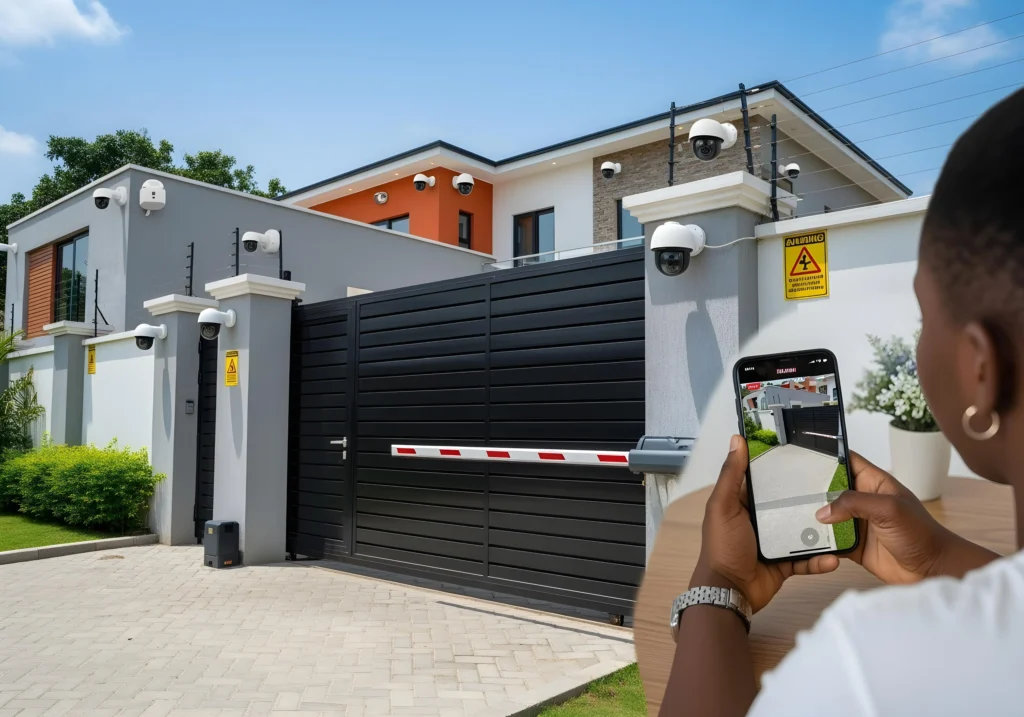
Security is one of the key reasons Ghanaians pick smart home solutions, and with good reason. In an environment when many homeowners are concerned about theft, intrusion, and property damage, adopting proactive measures is vital.
Smart security systems allow you to control and monitor your home even while you’re not there. Real-time notifications alert you when someone approaches your property or when a gate or entry opens. Remote access to CCTV feeds enables you to check in from your phone no matter where you are, whether in the office in Accra or on a trip outside the country.
We offer full security solutions, including:
- CCTV surveillance systems provide crystal-clear footage and cloud storage.
- An electric fence adds an extra layer of protection to your property.
- Automated gates that may be opened or closed remotely and secured using schedules or triggers.
- Smart security, by integrating visibility and automation, aims to avoid risks rather than merely respond to them.
By combining visibility with automation, smart security doesn’t just respond to threats, it helps prevent them.
Increased convenience and control
Life in Ghana’s metropolitan centres is hectic. From navigating traffic to balancing many obligations, time is frequently limited. That is where smart home technology adds genuine value: it simplifies the mundane.
A smart home setup allows you to:
- Lock your doors remotely while you’re already halfway across town.
- While you are still at work, open your gate to receive a delivery.
- Program your lights to turn on at dark or turn out automatically at sleep.
- Schedule equipment, such as water heaters or air conditioners, to run at particular hours.
Small comforts add up. They save time, decrease tension, and offer you a stronger sense of control over your surroundings. Whether you’re a busy mom or a tech-savvy worker, having your house adapt to your lifestyle is a significant improvement.
Improved Energy Efficiency
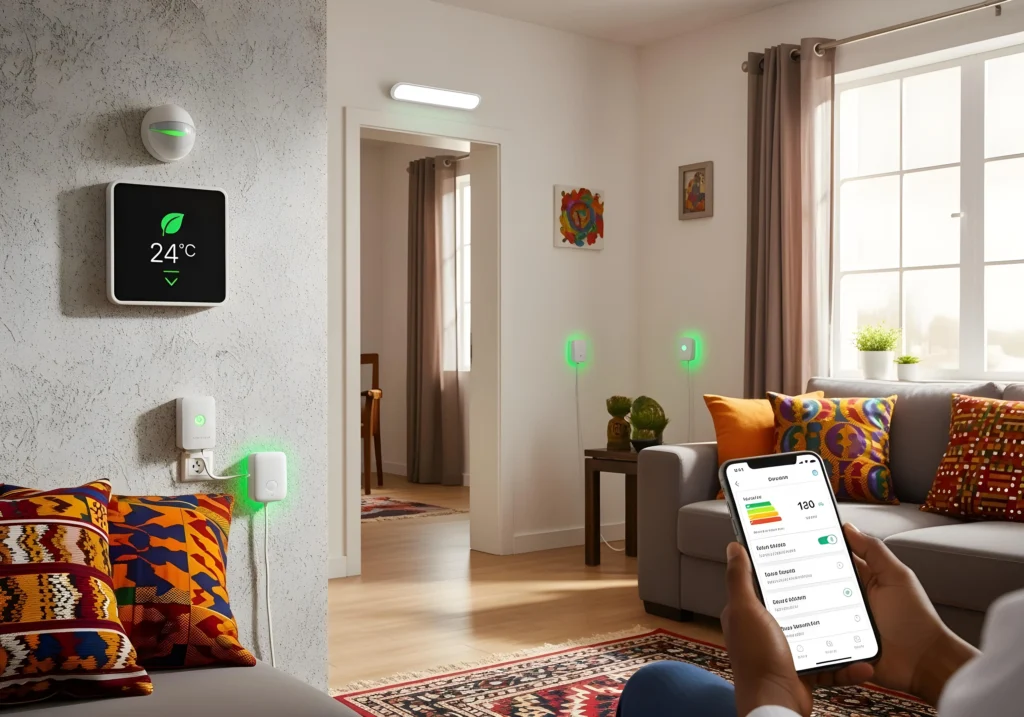
Rising utility bills and irregular power supplies are putting a strain on Ghanaian households. Smart home technologies are intended to optimise energy use, allowing you to get most out of each kilowatt.
This is how it works.
- Motion sensors may switch off lights and appliances in vacant rooms.
- Smart thermostats learn your preferred temperature settings and automatically adapt to conserve electricity.
- Smart plugs can completely shut down power to gadgets that consume electricity even when not in use.
These gadgets eliminate wasteful usage while maintaining comfort. Over time, this results in not just a more efficient home, but also one that is ecologically friendly.
Every unit saved counts in places where energy conservation is critical, such as those with high tariffs or load-shedding. Smart home technology empowers you to manage energy intelligently, not harder.
Long-term savings
While some may regard smart home systems as a pricey add-on, the long-term financial benefits frequently surpass the initial investment. Consider it a strategic investment in your property, security, and peace of mind.
Here’s how smart homes save money over time:
- Lower utility bills due to lower energy consumption.
- Improved monitoring and automated systems result in fewer maintenance difficulties.
- Insurance reductions may be available as a result of improved security.
- Increased property value, particularly for residences in Ghana’s new smart residential developments.
For landlords and developers, smart features can also increase rental income and property appeal, making homes more attractive to tenants who value safety, tech integration, and energy savings.
Is smart home technology affordable in Ghana?
This is one of the most often asked and crucial topics on the minds of many and we understand why. Many homeowners still believe that smart home technology is just for wealthy homes or estates. However, that view is changing rapidly.
The fact is that establishing a smart home in Ghana does not have to cost a fortune or need the installation of all devices at once. In fact, we frequently urge our clients to begin modest and gradually increase their investment.
A modest smart surveillance system, such as one with motion-detecting cameras and a smartphone app like Home Assistant, can be a cost-effective initial step. From there, you could add automatic lights, smart plugs, or a simple home hub that allows you to control various devices using your phone. Over time, when your budget allows, you may add more advanced technologies such as automatic gate systems, smart thermostats, and full-home automation.
This staged strategy makes smart house adoption more accessible to Ghanaian families, landlords, and property developers. It also guarantees that each step you take is personalized to your specific requirements, budget, and lifestyle.
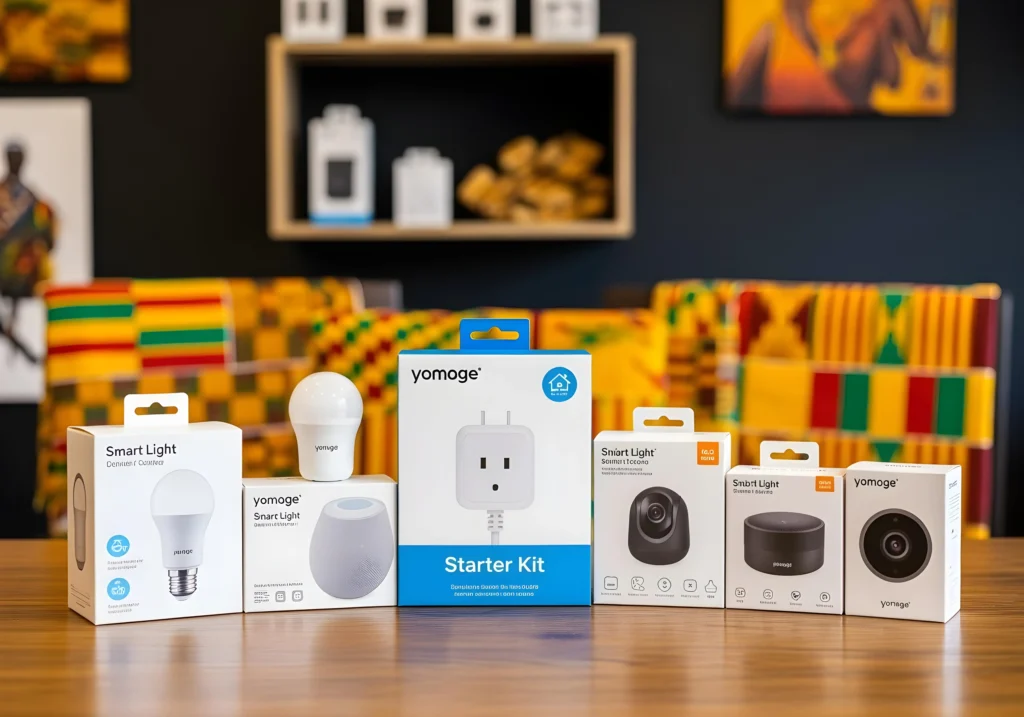
Technology is becoming more accessible
In recent years, the cost of smart home gadgets has drastically decreased. What was formerly considered expensive or imported technology is now widely available in Ghana through local shops and service providers. Furthermore, because many smart gadgets are modular, homeowners are not need to undergo a complete electrical makeover or invest in costly centralised control systems. Many features operate wirelessly and may be introduced with little inconvenience.
Even better, many of these systems work with existing appliances and buildings, allowing you to upgrade your present house without having to rebuild or relocate.
We Build Around Your Budget
Caretech’s objective is to make smart home technology practical and accessible to everyone, from young professionals buying their first house to real estate developers creating multi-unit complexes. We do not believe in one-size-fits-all solutions. Instead, we focus on creating solutions that meet your objectives while remaining within your budget.
- Do you own a modest two-bedroom home? We can install smart lights and a basic security system that will provide you with simple control.
- Managing a mid-sized apartment block? We can help you automate common areas and install centralised CCTV systems to ensure everyone’s safety.
- Creating a gated community? We’ll collaborate with you to develop and deploy comprehensive smart infrastructure, from electric fence to centralised control hubs.
The key is adaptability. Investing in a smart home solution, whether for ₵1,500 or ₵15,000, may enhance your space’s safety, intelligence, and efficiency.
The Long-term Payoff
Finally, keep in mind that affordability is more than simply the initial cost; it is also about long-term value. Smart homes decrease energy waste, prevent damage, and increase safety, all of which lead to long-term cost savings. These systems may also increase house value and resale attractiveness, making them a worthwhile investment rather than an expense.
So, is smart home technology affordable in Ghana? Yes, especially when it’s done the smart way. With the right plan, the right provider, and a focus on what matters most to you, a smarter, safer home is absolutely within reach.
How We Can Help You Build Smarter Homes
Caretech specialises in smart home setups specifically tailored for Ghana. We provide the following services:
- Smart Home Automation includes integrated lighting, temperature control, and gadget management.
- Surveillance and security include CCTV systems, motion sensors, alarms, and video doorbells.
- Electrical fencing and automated gates provide advanced perimeter protection and access control.
- Custom Consultation and Support: We provide personalised planning, installation, and aftercare based on your property and needs.
What sets us apart is our knowledge of the Ghanaian market. We understand the reality of the electrical grid, local network limits, and what homeowners and developers are looking for. Our systems are dependable, affordable, and built to grow with your lifestyle.
Our Final Thoughts
Smart homes are more than simply a fad; they are a deliberate answer to Ghana’s real-world issues and possibilities. Smart home technology provides you control and peace of mind, whether you’re looking to improve security, manage energy use, or enjoy modern luxuries.
The moment has come for homeowners, young professionals, real estate developers, and everyone investing in Ghanaian property to embrace smart living. And with a trustworthy local partner like Caretech, you don’t have to go it alone.
Interested in building a smarter home?
Get in touch with us today, and let’s help you bring your vision to life—securely, affordably, and intelligently.

